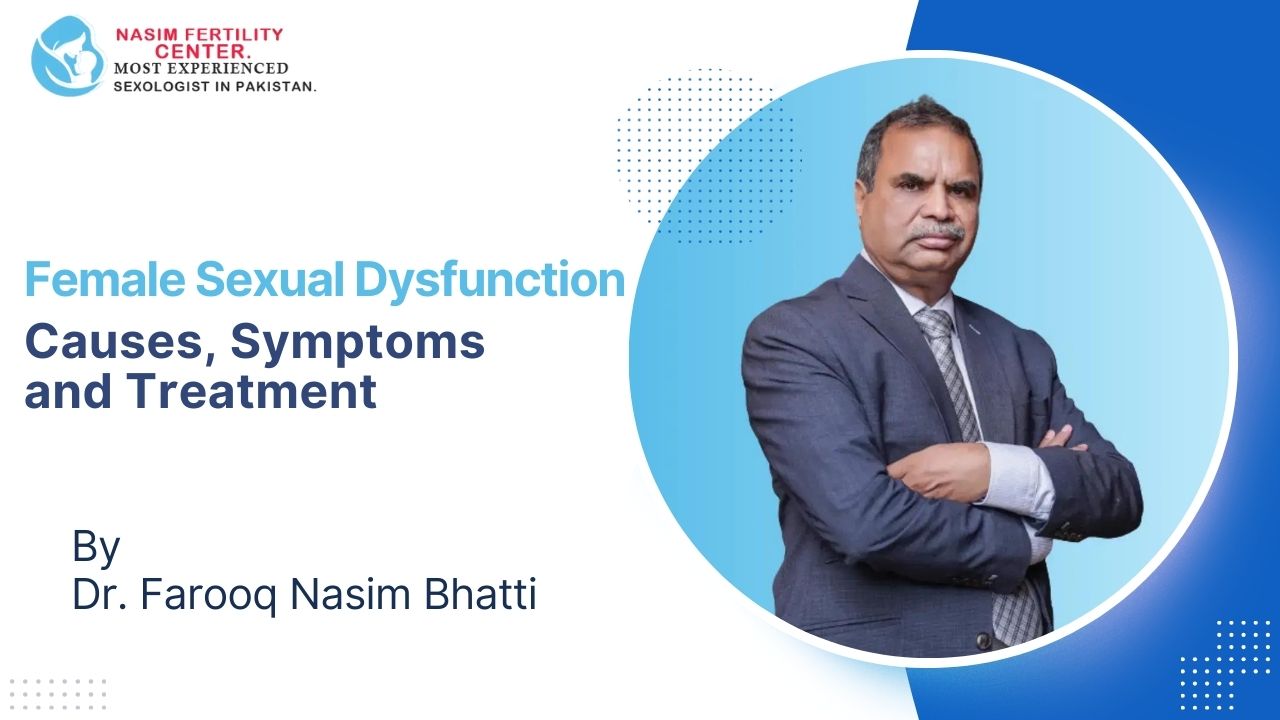
Female sexual dysfunction (FSD) is a common yet often misunderstood condition that affects women’s sexual health and overall well-being. It encompasses various challenges in sexual desire, arousal, orgasm, and pain during intercourse. In this blog post, we will explore the causes, symptoms, and treatments for female sexual dysfunction while addressing every key aspect of low libido in women.
What Is Female Sexual Dysfunction?
Female sexual dysfunction refers to persistent issues that prevent a woman from experiencing satisfaction during sexual activity. It can manifest in different forms, including low sex drive, difficulties with arousal, and painful intercourse.
Struggling with Low Desire or Intimacy Issues? You’re Not Alone
Dr. Farooq Nasim Bhatti offers expert, compassionate care for female sexual health—take the first step today.

Female Sexual Dysfunction Symptoms
Symptoms of female sexual dysfunction vary but may include:
- Reduced or absent sexual desire.
- Difficulty becoming aroused during sexual activity.
- Trouble achieving orgasm.
- Painful or uncomfortable intercourse.
- Emotional distress related to sexual intimacy.
If you experience these symptoms, consult an expert like Dr. Farooq Nasim Bhatti to understand the underlying causes and explore tailored treatment options.
Causes of Low Libido in Women
What causes low libido in females? Multiple factors contribute to low sex drive, including:
- Hormonal Changes: Fluctuations during menopause, pregnancy, or breastfeeding can lower libido.
- Medical Conditions: Diabetes, thyroid issues, and certain medications may impact sexual desire.
- Psychological Factors: Stress, anxiety, and depression play a significant role.
- Relationship Issues: Lack of emotional connection or unresolved conflicts can hinder intimacy.
Reasons for Low Sex Drive in Females
Identifying the reasons for low sex drive in females is crucial for effective treatment. Some notable reasons include:
- Chronic fatigue and lifestyle stress.
- Negative body image or self-esteem issues.
- Past trauma or negative sexual experiences.
- Side effects from antidepressants or birth control pills.
Low Libido Symptoms in Females
Symptoms of low libido in women are often subtle and may include:
- Decreased interest in sexual activities.
- A lack of sexual fantasies or thoughts.
- Reduced responsiveness to sexual stimulation.
Recognizing these symptoms early can lead to timely intervention.
Causes of Low Libido in Women
Various physical, emotional, and situational factors contribute to low libido in women. These include:
- Chronic illnesses such as cancer or arthritis.
- Sleep disorders and fatigue.
- Mismatched sexual expectations in relationships.
Low Female Libido Treatment Options
When it comes to addressing low female libido, treatment options are diverse and can be tailored to individual needs. These include:
- Sex Therapy and Relationship Counseling: Helps address emotional or psychological barriers.
- Medical Treatment: By examining your condition, your sexologist can prescribe you best possible medicines
- Hormonal Therapy: Restores balance in estrogen or testosterone levels.
- Lifestyle Changes: Improving diet, exercise, and stress management can boost libido.
Female Sexual Dysfunction Is Real—And Treatable
Break the silence. Get expert help from Dr. Farooq Nasim Bhatti and reclaim your confidence and connection.

Also Read: Anorgasmia Causes and Treatment
Low Sex Drive in Women Medication
Medications can effectively address low sex drive in women. By examining your condition, your sexologist can prescribe you best possible medicines
Always consult a healthcare professional to find the right medication for your condition.
Treatment for Women’s Low Libido
The treatment for women’s low libido focuses on identifying root causes and implementing a comprehensive approach. Common treatments include:
- Cognitive-behavioral therapy (CBT).
- Vaginal lubricants for discomfort during intercourse.
- Addressing co-existing medical conditions like diabetes or depression.
Female Sexual Dysfunction Treatment
Effective female sexual dysfunction treatment often involves a combination of therapies:
- Medical Interventions: Treating underlying health issues.
- Sex Therapy: Enhancing communication and intimacy with partners.
- Alternative Therapies: Acupuncture, yoga, and mindfulness exercises.
Treatment for Low Libido in Females
Dr. Farooq Nasim Bhatti specializes in advanced treatment for low libido in females. His expertise includes:
- Personalized hormone replacement therapy.
- Non-invasive therapies for vaginal rejuvenation.
- Integrative care that combines traditional and holistic approaches.
What Causes Low Libido in Females?
Understanding what causes low libido in females helps in creating an effective treatment plan. Factors include:
- Chronic stress or anxiety.
- Negative cultural or societal attitudes toward sexuality.
- Nutritional deficiencies affecting hormonal health.
Low Libido in Women
Low libido in women is a complex issue requiring a multi-dimensional approach. Seeking professional help ensures that the underlying causes are effectively addressed.
Diagnosis of Female Sexual Dysfunction
Diagnosing female sexual dysfunction requires a detailed and compassionate evaluation by a healthcare professional. The diagnostic process often involves:
- Discussing Your Sexual and Medical History: Your healthcare provider will ask about your sexual experiences, preferences, and any current challenges. This may feel personal, but being open and honest can significantly improve the chances of identifying and treating the underlying issues.
- Conducting a Pelvic Exam: A thorough physical examination helps detect changes like thinning of genital tissues, scarring, or other physical conditions that may affect sexual satisfaction.
- Ordering Blood Tests: These tests can identify hormonal imbalances, chronic illnesses, or other medical conditions contributing to sexual dysfunction.
- Recommending Counseling: If necessary, your doctor might suggest seeing a therapist who specializes in sexual health and relationship counseling to address psychological or emotional barriers.
Nonmedical Treatments
Nonmedical interventions are often the first step in managing female sexual dysfunction:
- Open Communication: Talking candidly with your partner about your needs and desires is essential. Sharing feedback constructively can strengthen intimacy and understanding.
- Healthy Lifestyle Changes: Adopting habits such as regular exercise, a balanced diet, and limiting alcohol consumption can enhance energy levels and improve overall well-being, which positively impacts sexual health.
- Stress Management: Finding ways to relax and reduce stress, such as yoga, meditation, or mindfulness, helps you stay mentally and physically focused on sexual intimacy.
- Therapy or Counseling: Working with a therapist who specializes in sexual health can help address psychological barriers, build intimacy, and improve your understanding of your sexual responses.
- Lubricants and Moisturizers: Vaginal lubricants and moisturizers can alleviate discomfort during intercourse, especially if dryness or pain is an issue.
- Sexual Activity: Engaging in sexual activity, either alone or with a partner, can promote blood flow to the genital area, reducing discomfort and enhancing sensitivity over time.
Why Choose Dr. Farooq Nasim Bhatti for Female Sexual Dysfunction Treatment?
Dr. Farooq Nasim Bhatti is Pakistan’s leading expert in sexual health, holding prestigious qualifications such as MBBS, FAACS (USA), and Diplomate of the American Board of Sexology (USA). As the only recognized medical sexologist in the country specializing in female sexual dysfunction, he combines extensive knowledge with years of experience to provide personalized and evidence-based treatment. His approach integrates advanced medical therapies, psychological support, and lifestyle modifications to address the unique needs of each patient, ensuring comprehensive care and lasting results.
Facing Pain, Low Arousal, or No Satisfaction in Bed?
Explore proven treatments with Dr. Farooq Nasim Bhatti—Pakistan’s trusted specialist in women’s sexual wellness.

Dr. Farooq Nasim Bhatti’s dedication to women’s health goes beyond medical treatment, offering a compassionate and confidential environment where patients feel comfortable discussing sensitive issues. He is committed to empowering women by helping them overcome challenges like low libido, hormonal imbalances, and other aspects of sexual dysfunction. With a proven track record of success, state-of-the-art methods, and an empathetic approach, Dr. Bhatti stands as a trusted name in female sexual health care in Pakistan.
Conclusion
Female sexual dysfunction is a sensitive yet manageable condition. By understanding the causes, recognizing the symptoms, and exploring the various treatment options available, women can regain their sexual health and overall well-being. Dr. Farooq Nasim Bhatti is dedicated to providing comprehensive care for sexual dysfunction in women, ensuring a personalized approach for every patient.
For professional assistance, book a consultation with Dr. Farooq Nasim Bhatti, Pakistan’s leading medical sexologist.
FAQs about Female Sexual Dysfunction
What is female sexual dysfunction?
Female sexual dysfunction refers to persistent issues in achieving sexual satisfaction due to problems with desire, arousal, orgasm, or pain during sexual activity.
What causes low libido in females?
Low libido can result from hormonal changes, medical conditions, psychological factors, relationship challenges, or side effects of medications.
What are the symptoms of female sexual dysfunction?
Symptoms include a lack of sexual desire, difficulty becoming aroused, trouble achieving orgasm, and painful intercourse.
Is female sexual dysfunction treatable?
Yes, treatment options such as counseling, hormonal therapy, lifestyle changes, and medications are effective in managing female sexual dysfunction.
Are there medications available for female low sex drive?
Yes, medications with consultation from sexologist and hormone-based treatments improve low libido in women. Consult a doctor to find the most suitable option.
How can I improve my libido naturally?
Adopting a healthy lifestyle, managing stress, engaging in open communication with your partner, and seeking therapy can naturally enhance libido.
Should I see a specialist for female sexual dysfunction?
Yes, consulting a specialist like Dr. Farooq Nasim Bhatti ensures a tailored approach to diagnosing and treating female sexual dysfunction.
Can relationship issues contribute to sexual dysfunction in women?
Yes, unresolved conflicts, lack of emotional intimacy, and communication gaps can significantly impact a woman’s sexual health.
What type of Questions your Healthcare provider can ask from you?
- How is your relationship?
- How much do your sexual problems bother you?
- Do you become aroused during sex with your partner?
- Do you have orgasms?
- Have you had orgasms in the past but no longer can?
- Do you have pain with intercourse?
- What form of birth control or hormones, if any, do you use?
- Have you ever had surgery that involved your reproductive system?
Disclaimer
This information is for educational purposes and not the treatment. For treatment, you need to consult the doctor.

Dr. Farooq Nasim Bhatti (MBBS, FAACS – USA, Diplomate: American Board of Sexology, CST, HSC – Hong Kong, CART – Malaysia & China) is a qualified medical sexologist with 30+ years of experience. He has presented 21+ research papers internationally and treats sexual dysfunction through sex therapy, counseling, and pharmacotherapy to restore natural sexual function without temporary medication.

Regain Confidence with Our ED Solutions
Explore effective treatments for erectile dysfunction. Take charge of your intimacy today.


